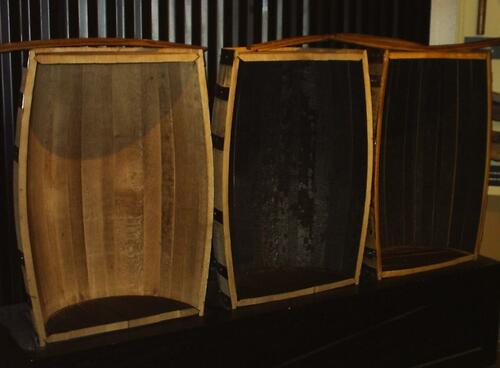
Authored by Chris Swonger via RealClear Wire,
It’s been five years since American Whiskey was slapped with a 25% retaliatory tariff from the EU, making it collateral damage in an unrelated Trump-era trade dispute. This caused a sudden and dramatic decline in U.S. Whiskey exports to Europe, which had been powering the industry’s remarkable growth over the preceding years—not just in Tennessee and Kentucky, but in 28 states across the country.
Distillers breathed a sigh of relief two years ago when the Biden Administration negotiated a temporary suspension of the tariffs. But that suspension is now set to lapse if negotiators don’t reach another agreement by the end of October. Worse, if a deal is not reached, the tariffs won’t just come back at 25%—they’ll double to 50%.
This would be a devastating blow to craft whiskey exporters like Dr. Sonat Birnecker Hart, founder of Koval Distillery in Chicago. She invested years into nurturing relationships at international trade shows and hosting frequent meetings with foreign distributors to earn highly competitive space on European shelves. The original tariffs were a costly setback, but she carefully, painstakingly rebounded over the last two years thanks to the suspension.
Now, it’s 2018 all over again—only worse. A 50% tariff would entirely eliminate Dr. Hart’s profits on European sales, requiring her to make an impossible decision: either she raises prices and loses her competitive edge in Europe, or she eats the costs herself to maintain market share in hopes that eventually the tariffs will be removed. Either way, the decline in profit will force belt-tightening at home, including potentially scaling back investments and jobs.
Throughout the temporary suspension of the past two years, distillers like Dr. Hart have proven how much potential there is for growth in Europe. American whiskey exports to the EU were up 118% in the first half of 2023 compared to the same period in 2022.
These numbers would have been far higher if the uncertainty of the tariffs wasn’t holding so many other distillers back.
One of them is Tom Lix, founder and CEO of Cleveland Whiskey. Prior to the tariffs, exports to Europe accounted for 15% of Tom’s business. After the tariffs, that dropped almost to zero. When the Biden administration negotiated the suspension two years ago, Tom was thankful but also acutely aware that it was only a temporary reprieve. Until there is some certainty related to the tariffs, he does not plan to go back to the EU market.
Imagine if distillers like Tom had never been forced onto the sidelines in the EU, the top export market for U.S. spirits. Think how much their revenue would have grown by now.
These gains are still there for the taking, but that might not be true forever. These tariffs could eventually do irreparable damage to the success of Bourbon and other American Whiskeys abroad. European consumers’ taste for our whiskeys can only be expected to withstand so many price shocks and supply setbacks before it begins to redirect toward Scotch, Japanese Whiskey, or spirits from other regions. And as Europe goes, so go other export markets.
If American distillers lose out in this critical market, we’ll feel it at home. The number of distilleries in the U.S. has gone from 35 two decades ago to 2600 today, making the spirits industry one of the shining economic success stories of recent times. But that growth would almost certainly wither without access to global markets. So, too, would the supply chain benefits.
America’s craft distillers purchase grain from local farmers, are major customers of bottling and manufacturing companies, and their tasting rooms have helped revitalize Main Streets by boosting tourism, jobs, and culture. This is a time to double down on growth industries, not saddle them with unnecessary tariffs.
U.S. distillers are urging the Biden administration to secure the permanent removal of these tariffs. The clock is ticking. Trade representatives from the U.S. and EU are set to meet during a summit in Europe on October 20th to discuss the matter, but there is no guarantee a deal will be struck in time.
In order to truly flower to its fullest potential, American Whiskey needs certainty and stability. It needs these tariffs to be removed so the industry can do what it was always meant to do—spread cheer throughout the world.
Chris Swonger is President and CEO of the Distilled Spirits Council of the United States.
Authored by Chris Swonger via RealClear Wire,
It’s been five years since American Whiskey was slapped with a 25% retaliatory tariff from the EU, making it collateral damage in an unrelated Trump-era trade dispute. This caused a sudden and dramatic decline in U.S. Whiskey exports to Europe, which had been powering the industry’s remarkable growth over the preceding years—not just in Tennessee and Kentucky, but in 28 states across the country.
Distillers breathed a sigh of relief two years ago when the Biden Administration negotiated a temporary suspension of the tariffs. But that suspension is now set to lapse if negotiators don’t reach another agreement by the end of October. Worse, if a deal is not reached, the tariffs won’t just come back at 25%—they’ll double to 50%.
This would be a devastating blow to craft whiskey exporters like Dr. Sonat Birnecker Hart, founder of Koval Distillery in Chicago. She invested years into nurturing relationships at international trade shows and hosting frequent meetings with foreign distributors to earn highly competitive space on European shelves. The original tariffs were a costly setback, but she carefully, painstakingly rebounded over the last two years thanks to the suspension.
Now, it’s 2018 all over again—only worse. A 50% tariff would entirely eliminate Dr. Hart’s profits on European sales, requiring her to make an impossible decision: either she raises prices and loses her competitive edge in Europe, or she eats the costs herself to maintain market share in hopes that eventually the tariffs will be removed. Either way, the decline in profit will force belt-tightening at home, including potentially scaling back investments and jobs.
Throughout the temporary suspension of the past two years, distillers like Dr. Hart have proven how much potential there is for growth in Europe. American whiskey exports to the EU were up 118% in the first half of 2023 compared to the same period in 2022.
These numbers would have been far higher if the uncertainty of the tariffs wasn’t holding so many other distillers back.
One of them is Tom Lix, founder and CEO of Cleveland Whiskey. Prior to the tariffs, exports to Europe accounted for 15% of Tom’s business. After the tariffs, that dropped almost to zero. When the Biden administration negotiated the suspension two years ago, Tom was thankful but also acutely aware that it was only a temporary reprieve. Until there is some certainty related to the tariffs, he does not plan to go back to the EU market.
Imagine if distillers like Tom had never been forced onto the sidelines in the EU, the top export market for U.S. spirits. Think how much their revenue would have grown by now.
These gains are still there for the taking, but that might not be true forever. These tariffs could eventually do irreparable damage to the success of Bourbon and other American Whiskeys abroad. European consumers’ taste for our whiskeys can only be expected to withstand so many price shocks and supply setbacks before it begins to redirect toward Scotch, Japanese Whiskey, or spirits from other regions. And as Europe goes, so go other export markets.
If American distillers lose out in this critical market, we’ll feel it at home. The number of distilleries in the U.S. has gone from 35 two decades ago to 2600 today, making the spirits industry one of the shining economic success stories of recent times. But that growth would almost certainly wither without access to global markets. So, too, would the supply chain benefits.
America’s craft distillers purchase grain from local farmers, are major customers of bottling and manufacturing companies, and their tasting rooms have helped revitalize Main Streets by boosting tourism, jobs, and culture. This is a time to double down on growth industries, not saddle them with unnecessary tariffs.
U.S. distillers are urging the Biden administration to secure the permanent removal of these tariffs. The clock is ticking. Trade representatives from the U.S. and EU are set to meet during a summit in Europe on October 20th to discuss the matter, but there is no guarantee a deal will be struck in time.
In order to truly flower to its fullest potential, American Whiskey needs certainty and stability. It needs these tariffs to be removed so the industry can do what it was always meant to do—spread cheer throughout the world.
Chris Swonger is President and CEO of the Distilled Spirits Council of the United States.
Loading…




